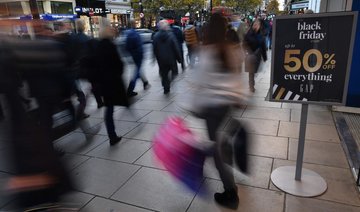NEW JERSEY: US shoppers had splurged more than $1.52 billion (SR5.7 billion) online by Thanksgiving evening, and more bargain hunters turned up at stores this year after two weak holiday seasons as retailers opened their doors early on the eve of Black Friday.
At the start of the holiday season consumer spending rose 16.8 percent year-over-year until 5pm ET on Thursday, according to Adobe Analytics, which tracked 80 percent of online transactions at the top 100 US retailers.
Surging online sales and a shift away from store shopping have thinned the crowds typically seen at stores on Thanksgiving evening and the day after, Black Friday, for the past two years. But a strong labor market, rising home prices and stock markets at record highs have improved shopper appetite this year.
Crowds at stores in many locations around the country were reported to be strong, according to analysts and retail consultants monitoring shopper traffic across the US
“The turnout is clearly better than the last couple of years,” said Craig Johnson, president of Customer Growth Partners. “The parking lots are full and the outlet malls are busy.”
The retail consultancy has 20 members studying customer traffic in different parts of the country.
Moody’s retail analyst Charlie O’ Shea, who was in Bucks County, Pennsylvania, reported healthy traffic at local stores including consumer electronics chain Best Buy, clothing store Old Navy and retailer Kohl’s Corp.
“The weather is cooperating and people here are out,” he said.
The National Retail Federation is projecting that sales for November and December will rise 3.6 percent to 4 percent this year, versus a 4 percent increase last year. Non-store sales, which include online sales and those from kiosks, are expected to rise 11 percent-15 percent to about $140 billion.
In New Jersey, around 50 people lined up a Macy’s at the Westfield Garden State Plaza mall before it opened and around 200 people stood outside the Best Buy store, many to pick up their online orders.
“Me and my husband have a bigger place and we need a bigger TV for the living room,” said Jenipher Gomes, who bought a 50-inch Samsung TV at Best Buy for $399.99. Shopper Hammad Farooq said he waited at the store for an hour to shop for laptops and monitors.
In Chicago, shoppers appeared to be slightly less enthusiastic to emerge from their turkey slumber and crowds were thin along the city’s popular shopping destination, State Street.
“There’s a few more people than normal but I wouldn’t call this crowded at all,” Deloitte auditor Eugenia Liew said as she shopped at discount retailer Target. “I expected a lot more people.”
The holiday season spanning November and December is crucial for retailers because it can account for as much as 40 percent of annual sales. Retailers try to attract shoppers with deep discounts.
Average discounts ranged between 10 and 16 percent with the best deals online on Thanksgiving evening available for computers, sporting goods, apparel and video games, according to date from Adobe.
The number of customers shopping on their smartphones surged, accounting for 46 percent of the traffic on retail websites, while traffic from desktop and laptop computers declined 11 percent and nearly 6 percent respectively, according to the data.
US online sales surge as shoppers splurge on eve of Black Friday
US online sales surge as shoppers splurge on eve of Black Friday

Pakistan hikes petrol price by Rs8 per liter for next fortnight

- Pakistan also increases price of high-speed diesel by Rs5.16 per liter, says energy ministry’s notification
- Latest price hikes takes place amid increased tensions in Middle East following US, Israel airstrikes against Iran
KARACHI: Pakistan’s government has increased the price of petrol by Rs8 per liter for the next fortnight, the Ministry of Energy announced in a notification this week.
The notification issued late Saturday night said the new price of petrol has increased from Rs258.17 to Rs266.17 per liter.
Meanwhile, the new price of high-speed diesel (HSD) has also increased by Rs5.16 per liter, pushing the new price to Rs280.86 per liter.
“The government has revised the prices of petroleum products based on recommendations of OGRA [Oil and Gas Regulatory Authority],” the notification reads.
Fuel prices in Pakistan are reviewed fortnightly and are influenced by global oil prices, exchange rate movements and domestic taxes. The pricing mechanism passes changes in import costs on to consumers.
Pakistan’s government also increased the price of petrol by Rs5 per liter and that of HSD by Rs7.32 per liter on Feb. 15.
The latest price hike takes place amid increased tensions in the Middle East, a day after the US and Israel launched airstrikes against Iran.
Iran retaliated by attacking US military bases in several Gulf nations. Analysts fear the conflict could rattle global markets, particularly if Iran makes the Strait of Hormuz unsafe for commercial traffic.
A third of worldwide oil exports transported by sea passed through the strait in 2025.












